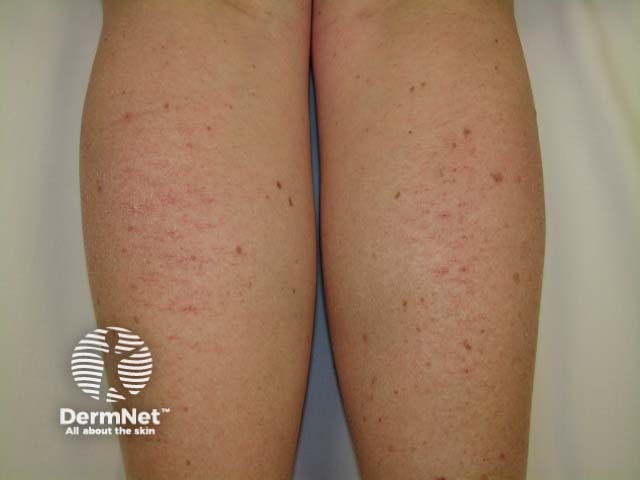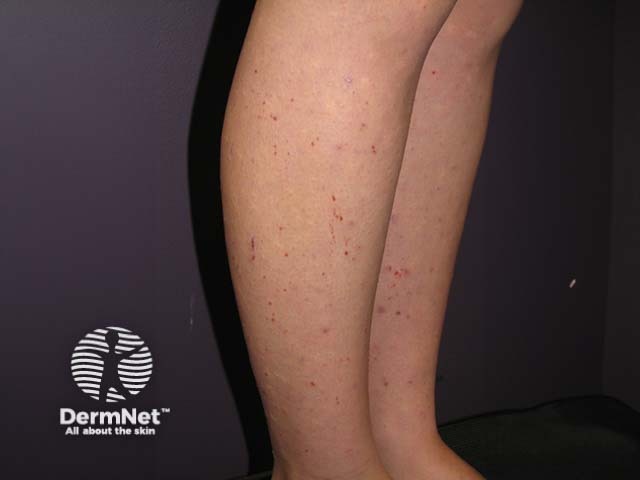Main menu
Common skin conditions

NEWS
Join DermNet PRO
Read more
Quick links
Winter itch — extra information
Winter itch
Author: Dr Varitsara Mangkorntongsakul, Junior Medical Officer, Central Coast Local Health District, Gosford/Hamlyn Terrace, NSW, Australia. DermNet Editor in Chief: Adjunct A/Prof Amanda Oakley, Dermatologist, Hamilton, New Zealand. Copy edited by Gus Mitchell/Maria McGivern. August 2018.
Introduction Demographics Causes Clinical features Diagnosis Treatment Outcome
What is winter itch?
Winter itch, also known as pruritus hiemalis, is a type of subclinical dermatitis, that affects individuals during cold weather.
Clinical signs of winter itch

Apparently normal skin

Excoriations

Dermatitis
Who gets winter itch?
Winter itch can affect the healthy population of all ages, but has a higher prevalence in older people with dry skin.
- It is uncommon in children and adolescents.
- It affects men and women equally.
- It is not influenced by socioeconomic status or personal hygiene.
What causes winter itch?
The exact cause of winter itch is unknown. Factors associated with winter itch include:
- Itching associated with cold weather, often coexisting with dry skin
- Itch presenting in autumn and winter, and clearing up during the summer months
- The aggravation of symptoms by the wearing of certain types of textures, such as flannel or woollen wear.
Similar symptoms have also been reported in patients exposed to refrigerated air conditioning during the summer months. Winter itch is not influenced by frequency of bathing or by the temperature of the bath water.
What are the clinical features of winter itch?
Winter itch does not cause a primary visible rash. The affected skin generally appears healthy, but usually slightly dry.
- The itch affects most or all parts of the body, but most commonly occurs on the legs.
- Typical sites are the inner surface of the thighs, above and behind the knees, on the calves, and around the ankles.
- It does not affect the hands, feet, face or scalp.
- The degree of irritation varies from mild to severe; when severe, it can result in great distress and discomfort, that may require medical attention.
- The itchiness is sudden in onset, and is generally most noticeable at night and when removing clothing.
Secondary lesions arise as a consequence of chronic scratching.
- The skin becomes erythematous with noticeable scratch marks.
- Scratched skin may be dry, rough and thickened (lichenified).
- Intense rubbing of the skin may cause desquamation.
- There may be a secondary folliculitis, with torn and broken hair shafts due to constant scratching.
How is winter itch diagnosed?
Winter itch can be associated and confused with other diseases that cause itchiness, particularly dermatitis (where there is a visible rash), and pruritus associated with systemic diseases (which tends to be generalised).
Detailed history taking and careful examination are important to rule out other potential causes of pruritus.
What is the treatment for winter itch?
Treatment is mainly to provide symptomatic relief and prevent scratching.
- Bathe in warm water prior to sleep. Some people report a benefit from the addition of sodium bicarbonate to the water (a quarter of a cup of baking soda swished around in a full bath).
- Emollients are the mainstay of treatment. Apply a moisturising cream after bathing and whenever the skin feels itchy or dry.
- Wear lightweight clothing such as silk, linen, and muslin.
- Avoid irritating fabrics, such as woollen clothing.
- Use topical corticosteroids to treat secondary dermatitis and lichen simplex.
- Capsaicin cream can be useful for localised areas of persistent itch.
Prescriptions
Systemic agents are not indicated for winter itch, but oral antihistamines and systemic corticosteroids are sometimes prescribed as a clinical trial.
What is the outcome for winter itch?
Winter itch normally resolves after the winter months.
- The duration of itching varies among individuals. It may last for a few days or weeks, and occasionally throughout the winter.
- Winter itch may recur throughout a person’s lifetime or disappear permanently at the end of the first attack.
References
- Duhring LA. Pruritus hiemalis: An undescribed form of pruritus. A practical treatise on diseases of the skin. Philadelphia: JB Lippincott & Co, 1874: 3–20.
- Handfield-Jones S. Itching. Medicine 2009; 37: 273–6. DOI: 10.1016/j.mpmed.2009.02.007. Journal
- Yosipovitch G, Hundley JL. Practical guidelines for the relief of itch. Dermatol Nurs 2004; 16; 325–8. Available from: https://www.medscape.com/viewarticle/488914_3
- Chernosky ME. Pruritic skin disease and summer air conditioning. JAMA 1962; 179: 1005–10. DOI: 10.1001/jama.1962.03050130009003. Journal
On DermNet
- Pruritus
- Dermatitis
- Rashes affecting the lower legs
- Heat and cold
- Reactions to external agents
- Dry skin
- Familial cold autoinflammatory syndrome
- Cold urticaria
- Differential diagnosis of very itchy skin
